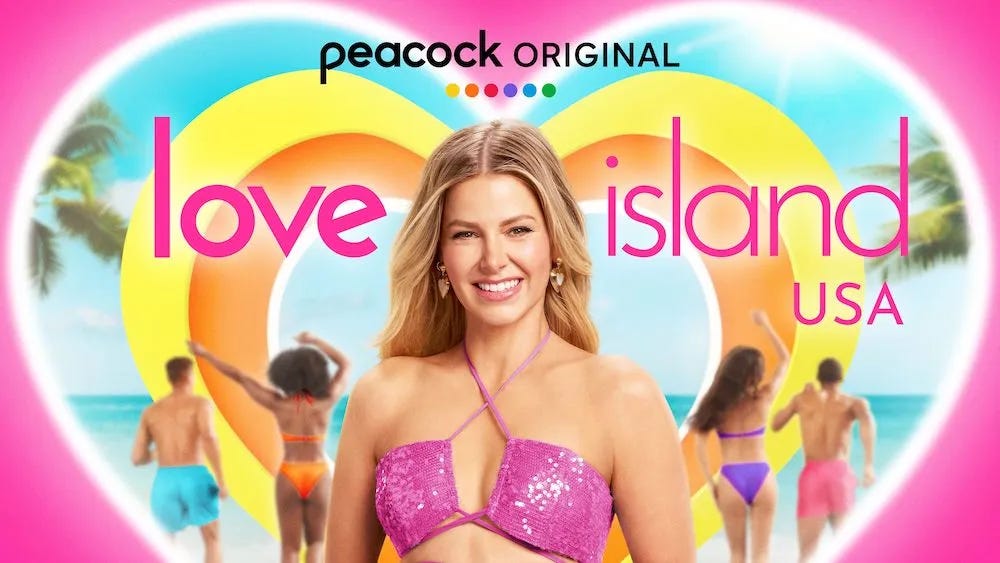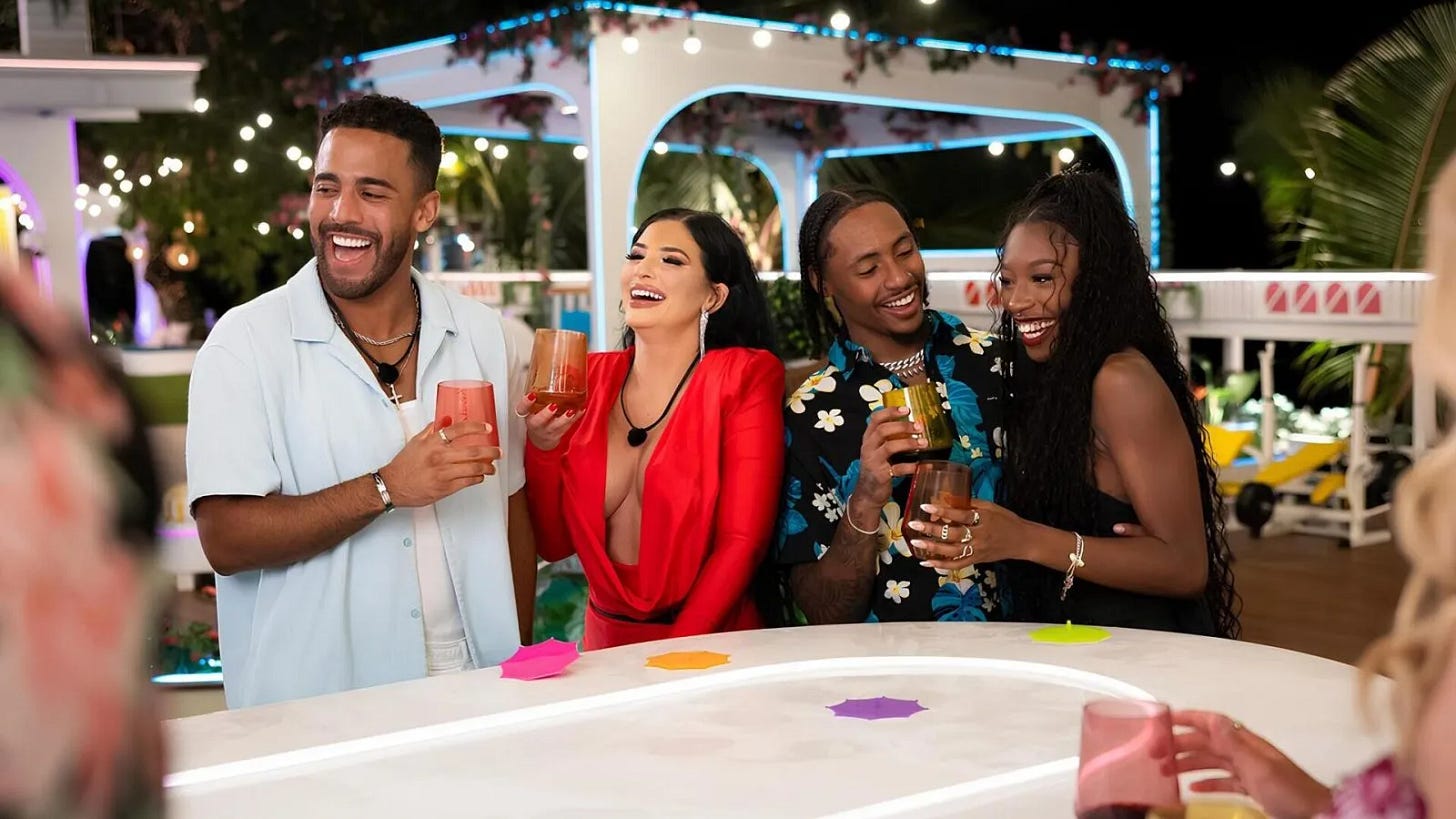Besides the 2024 United States women's gymnastic squad and the 1999 United States Women’s National Team, the only thing that makes me proud to be an American is season six of Love Island USA.
That’s right – six seasons, three hosts, multiple filming locations, two (and a half?) networks, and one pandemic later, Love Island USA is churning out a better season than its predecessor in the UK.
It’s hard for me to admit it. I started watching the franchise on Hulu in 2018, beginning with all of the UK seasons that were available to binge (yes, ALL OF THEM including season one!!!) before moving on to the Australian series. I was hooked immediately.
There’s something fascinating in an almost anthropological sort of way about watching these young adults so unlike myself trying to “find love” (and/or win a huge cash prize; and/or become a full-time influencer) all while being filmed every second of the day for both national and international audiences.
Typically, the UK series provides more entertaining, “unhinged” contestants, who make bad decisions to the delight of Love Island fans everywhere. Their varied accents from around the UK also add a certain charm to the show that is hard to replicate.
As Love Island UK has grown more and more popular globally (in large part due to social media), it’s clear the contestants are now extremely aware of the viewers’ opinions and how those opinions will affect their lives once they leave the Villa. From dangerous online harassment on the contestants’ social media accounts to more than a few deaths by suicide associated with the show, Love Island contestants everywhere have a valid cause for concern about how they’re portrayed and edited during their season. Thus, the islanders on the recent seasons of Love Island UK seem to be toning down their behavior to avoid intense criticism and bullying.
Obviously, that’s understandable, and their health and well-being are far more important than the content of a trashy reality television show.
At the same time, the islanders have lost almost all the personality and authenticity that made Love Island UK so much fun to watch.
After ten seasons, the contestants on season eleven of Love Island UK – most of whom have been watching the show since they were pre-teens – are fully aware of how to play the game. They know when to tell their partner they want to be exclusive, how they should react when they’ve been wronged, and that friendships in the Villa are just as important as the romantic relationships.
Should an islander misbehave, they know to correct their behavior immediately and apologize for their actions, or else their reputation in the “outside world” is ruined.
This, frankly, has created boring television.
Sure, there’s been some drama, but once the Casa Amor dust settles and all the couples who were at each others’ throats suddenly find it in their hearts to forgive each other, the season has pretty much come to a halt. After yesterday’s episode ended with one of my favorite islanders leaving the Villa with her dumped partner, I decided to bow out for the season.
Just like I did last season. And the season before that.
So what’s the big deal about Love Island USA season six?
The first few seasons of Love Island USA struggled to find its footing in the global franchise. Aside from the loyal Love Island fan base who would watch any iteration of the show, the general American population was unacquainted with the series. I remember trying desperately to get my friends into the first season of Love Island USA when it premiered on CBS in 2019, but it failed to hold their attention.
Additionally, I’ve found a lot of people who are unfamiliar with the concept of Love Island have trouble with the episode schedule. With new episodes releasing almost every day of the week, uninitiated viewers might find this daunting. “What if I miss a new episode?” “What if I can’t catch up?” “How much time do I have to dedicate to watch a bunch of twentysomethings with severe plastic surgery and blinding veneers sit around a pool all day talking about who they want to grab for a chat and making insane comments about pop culture and geography?”
Because of Love Island USA’s relatively small audience, I assume the US islanders don’t worry about public scrutiny quite as much as their counterparts across the pond. Because who’s actually watching?
But this season everyone seems to be watching.
With islanders like Leah, Rob, Aaron, Kaylor, Jana, Kordell, Serena, and Liv, how could you not?
These islanders are messy. They’re unafraid to confront each other. To make risky moves, To awkwardly participate in a TikTok trend for an ill-fated (yet viral) social media promo.
 Tiktok failed to load.
Tiktok failed to load.Enable 3rd party cookies or use another browser
They’re not worried about how they look because they don’t think anyone’s watching.
While the recent Social Media Challenge let the isolated islanders know what the public is thinking of their behavior, I truly don’t believe they know the full cultural impact of their season.
In general, the response to this season on social media has been overwhelming, especially compared to the previous five seasons. The only reason I started watching season six was because my entire TikTok FYP was taken over by viewers reacting to the latest episodes.
Some of these fans are equating season six to Love Island UK season five, a beloved fan-favorite season featuring some of the franchise’s most iconic moments.
The final ingredient to Love Island USA’s recent success is its new host, Ariana Madix.
There are few things more powerful than the Bravo fandom, and Ariana brought them to the Villa with her.
Unsurprisingly, Ariana is really good at this particular gig. Her witty quips, relatable annoyance with the men, and genuine love of the franchise make her the best host of this Love Island series by far.
Love Island USA season six has so much going for it. I can only hope the good content continues until the final couple are crowned the winners.








